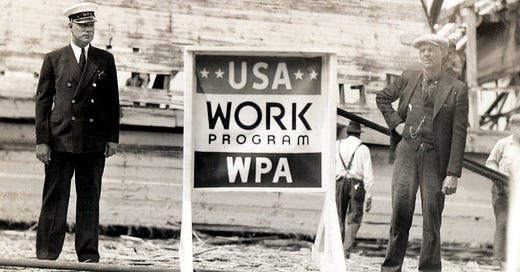This post goes out to both free and paid subscribers, but if you are not already a paid subscriber and value this effort and our growing community, please consider upgrading to a paid membership. Thanks in advance for your financial support of my work —it’s what allows me to keep researching and writing — not kidding!

The Works Progress Administration (WPA) is one of the many programs President Franklin Roosevelt funded to put people back to work and pull the United States out of the Great Depression. The WPA was funded by the Emergency Relief Appropriations Act signed in 1935, two years after Roosevelt was sworn in as president. It put to work over 8.5 million people on 1.4 million public projects like “creating parks, and building roads, bridges, schools and other public structures”.
Nearly a century after the Great Depression and despite pushback from close to half of our elected officials, our government continues its investment in our individual and collective futures. Since President Biden took office in January 2021, he has signed four major pieces of legislation, all in the last (117th) Congress:
The American Rescue Plan Act (ARP) passed in the spring of 2021
The Infrastructure Investment and Jobs Act (IIJA) passed in the fall of 2021
The Chips and Science Act passed in August of 2022
The Inflation Reduction Act (IRA) passed in August of 2022
I wrote about this legislation in a previous post discussing President Biden’s industrial policy choices, and pointed out that the Administration’s overall industrial policy driven by this legislation is also ‘place-based’ — it targets specific areas of the country in need of rejuvenation, “adding up to some $80 billion of authorized spending—distributed across three of the four previously mentioned pieces of legislation (ARP, IIJA, and the CHIPS and Science Act)."
It’s worth adding some background information to explain how these laws were passed: Each was passed with either no Republican support or what is touted as “bi-partisan support”, meaning a small minority of Republicans voted in favor of each bill. Specifically, both the American Rescue Plan and the Inflation Reduction Act were passed by Congress and signed by President Biden with zero Republican support. The Infrastructure Law passed with the votes of 32 Republicans total — 13 in the House and 19 in the Senate, and the CHIPS and Science Act passed with the votes of 41 Republicans total — 24 in the House and 17 in the Senate.
And each of these major pieces of legislation plus numerous executive orders President Biden has signed and regulations he has spearheaded have given boosts to not only our poorest citizens, but to the working poor and middle class, millions of whom live paycheck-to-paycheck each month. Here are a few examples of how these laws are investing in regular Americans, rather than the richest few percent:
— The American Rescue Plan paid qualifying people directly in cash (at least one $1,400 check) and extended both the child tax credit and extra $300 a month in unemployment benefits;
— The Infrastructure and Jobs Act has put hundreds of thousands of people to work in renewable energy jobs and repaired or replaced roads, bridges, and water pipes, and allocated millions to expand and subsidize broadband services;
— The CHIPS and Sciences Act invests in research, development and production of semiconductor chips to be manufactured in the U.S. rather than ceding this essential market to China; and
— The Inflation Reduction Act supports incentives for clean energy, reduces the federal deficit by raising taxes on the wealthiest Americans and corporations and capping prescription drug costs for those on Medicare.
Additionally, in the last three-plus years, President Biden has directed regulation and issued executive orders to:
— eliminate or reduce “junk fees”, including credit card late fees; expand the number of workers entitled to overtime pay, support unions to increase pay and improve working conditions; forgive millions in student loans, particularly for those students deceived by unscrupulous, for-profit colleges and universities; limit pollution in poor and minority communities; increase food stamp monthly allotments, expand access to more affordable child care, care for the elderly and disabled, and increase pay for care workers…among many other actions that improve the lives of those struggling financially.
In fact, I recently made a Comment and Note to this effect on
‘s newsletter, , and several hundred people seemed to agree— directly addressing poverty and “slipping in help” in major pieces of legislation is important for everyone, not just those in need.But the problem is the substantial work President Biden has accomplished to improve both the the overall economy and the lives of the poor have not registered with much of the electorate. A poll conducted at the end of April by Politico questioned 1,974 registered voters across the country through an online survey. The biggest and perhaps most perplexing takeaway, as summarized in a Politico article published last week, is that between 24% — 44% of those polled said they had not “seen, read or heard” anything at all about these four major pieces of legislation. The poll numbers did break down by party affiliation, with a larger number of Democrats having heard or read more about these laws than Republicans or Independents. These laws were splashed across newspapers and discussed nonstop on most news programs, and President Biden has campaigned and advertised on these signature accomplishments in swing states and social media for at least the last year. Apparently, what we have here is not a failure to communicate, but an eerily uninformed electorate.
It shouldn’t matter whether you tend to vote Republican, Democrat or Independent, or which party holds the White House — it is required of you to stay informed about what your government is doing, what legislation has passed, whom it impacts and how. Our country has a presidential election less than six months away, and I beg you to get informed and stay informed. Please don’t vote based on opinions you make up in your head, vote based on facts you have learned from reliable sources. We are a representative democracy, and it is our obligation to be an educated and informed citizenry…and then vote. I can understand if this post sounds like a campaign ad for President Biden, but it isn’t. Rather, it is purely informational. You don’t need to agree, you just need to know so you can make informed opinions and choices.
By the way, even my cat, Bella, who will be a robust 20 years young by election day if good fortune prevails, insists on staying informed, registering to vote and exercising that right from the moment she turned 18.
—————————————————————————
How about you? Have you kept up with the choices our government is making? Do you intend to vote in the November election? Please leave your thoughts in the Comment Section, below.
And if you are not already a subscriber, you can sign up for a free or paid subscription here:












Share this post